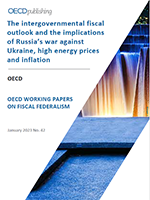Fiscal federalism network
Focus
-
New Flagship Volume
Fiscal Federalism 2022 synthesises the work of the Network over the past decade and a half, on how to balance the policy trade-offs inherent in intergovernmental fiscal relations, making use of its novel analytical results.
Read more -
Presidential Conference on Inclusiveness and Decentralisation
The Korean Presidential Committee on Autonomy and Decentralisation and the Fiscal Network organised a Conference on Inclusiveness and Decentralisation in Seoul, Korea. The objective of the Conference was to review the current state of fiscal decentralisation and policy implications from OECD countries' experiences and explore future reform actions. An MoU for future co-operation was signed with the OECD.
Read more -
OECD Fiscal Federalism Studies
The OECD Fiscal Federalism Series presents policy analysis of, and statistics about, intergovernmental fiscal relations and state/regional and local public finance. It draws on the work of the OECD Network on Fiscal Relations across Government Levels and of other OECD bodies covering these areas.
Read more
The OECD Network on Fiscal Relations across Levels of Government provides policy analysis and statistical underpinnings on the relationship between national and subnational governments, and its impact on efficiency, equity and macroeconomic stability.

News & events
New: The Intergovernmental Fiscal Outlook
- The Intergovernmental Fiscal Outlook for 2023 and 2024 -- Interim Version
- Deploying AI and data analytics to support intergovernmental fiscal relations
19th Annual Meeting of the OECD Network on Fiscal Relations Across Levels of Government, 20-21 April 2023

Workshops
- The workshop Local Housing Inequity and its Implications for the Role of Government was jointly organised by the Fiscal Network and KIPF. The final book volume, Bricks, Taxes and Spending, is available here.
- The workshop Dispelling Myths about Participatory Budgeting across Levels of Government was jointly organised by the Fiscal Network and the Senior Budget Officials’ Working Party on PBOs & IFIs. A summary is available here.
- The workshop Going Beyond Fiscal Equalisation: Institutional and fiscal tools to fight territorial inequalities was jointly organised by the Fiscal Network and the Centre for Entrepreneurship, SMEs, Regions and Cities (RDPC). A summary is available here.
OTHER EVENTS...
Selected publications
 |
The intergovernmental fiscal outlook and the implications of Russia’s war against Ukraine, high energy prices and inflation The objective of this policy note is to examine the main consequences of this challenging environment for the fiscal stance of different levels of governments. These include the weakening outlook for government revenues in times of high expenditure pressures from a more rapid energy transition as well as high borrowing costs. Subsequent updates of the projections contained in this note, using the same methodology -- based on the latest OECD Economic Outlooks -- are published in the Intergovernmental Fiscal Outlook for 2023 and 2024. |
|
 |
Fiscal Federalism 2022: Making Decentralisation Work Fiscal Federalism 2022 surveys recent trends and policies in intergovernmental fiscal relations and subnational government. Accessible and easy-to-read chapters provide insight into: good practices in fiscal federalism; the design of fiscal equalisation systems; measuring subnational tax and spending autonomy; promoting public sector performance across levels of government; digitalisation challenges and opportunities; the role of subnational accounting and insolvency frameworks; funding and financing of local government public investment; and early lessons from the COVID-19 crisis for intergovernmental fiscal relations. |
|
 |
Making Property Tax Reform Happen in China This report looks at crucial elements of reforms to growth-friendly recurrent taxes on immovable property. Tax design practices in place in OECD and partner countries are compared and analysed through the lenses of economic theory and empirical analysis. A set of good principles and options for reforming recurrent taxes on immovable property based on the latest experience of property tax reforms around the world are presented that are particularly relevant to the Chinese context, where broader use of recurrent taxes on residential properties is needed to make local public finances more sustainable. |
Engage
- Email us: fiscalnetwork@oecd.org
- Follow us on social media: @OECDtax (Twitter) & OECD Tax (LinkedIn)